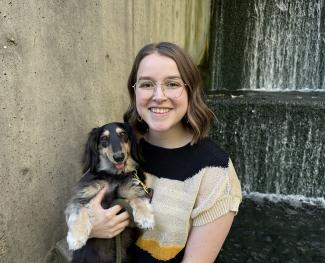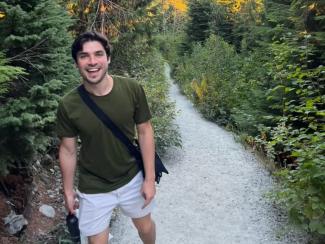For many Allard Law students, summer employment can be a great way not only to fund their legal education, but also to gain practical legal skills and build connections in the legal community.
We spoke four law students who just finished their first year at Allard – Gabby Lees, Tinashe Muzah, Tristan Kimball and Stephanie Shin – to learn more about where they’re working this summer and what they’ve learned so far.
Gabby Lees: Course Instructor, LSAT Preparation Course for Black and Indigenous Applicants

Tell us about your current summer job.
I’m teaching the LSAT Preparation Course for Black and Indigenous Applicants. I create the lesson plan, hold office hours, and teach a 2-hour class in the evenings. I also work with the Office of Admissions to plan information sessions for prospective students.
What are you enjoying most about your job?
I’m grateful for the opportunity to encourage BIPOC individuals to apply to Allard, or law school in general. The LSAT can be a significant barrier for many applicants, especially those without access to tutoring. By teaching this course, I feel like I’m directly tackling systemic barriers that hinder BIPOC representation in the legal profession.
Would you recommend this job to students looking for a summer position next year? And why?
Absolutely! It's a great initiative put on by the school, and it’s a test that you’ve already mastered. You will get to connect to wonderful people who are passionate about starting law school.
By teaching the LSAT, I’ve also improved my communication and presenting abilities immensely. Being able to clearly convey instructions can be beneficial in many areas of the law.
Tinashe Muzah: 1L Summer Student at Bennett Jones LLP (Calgary)

Tell us about your current summer job.
This summer I'm working at a full-service business law firm. So, my current job mainly consists of supporting lawyers on various corporate or litigation matters. This typically involves reviewing case law and legislation, researching and writing memos, and drafting agreements or applications.
What was it about this job that initially appealed to you? Has this job met your expectations?
I wasn’t sure what type of law I wanted to practice going into law school. To be perfectly candid, I’m still not entirely sure! When I was choosing a summer job I wanted to have the opportunity to try lots of different things and narrow down my options. At Bennett Jones, I’ve gotten to work on litigation, tax and corporate matters, and been involved in business development work, which has exposed me to the business side of practicing business law.
During 1L, I was repeatedly told that practicing law is just as much about who you practice with, as it is what you practice. As a summer student I’ve gotten to meet and work with really fun, interesting, and dynamic people. I’ve learned a lot about the practice of the law from them and a lot of great life and career lessons that will be a big help when I finish school.
What is one thing you’ve learned so far that you think you’ll take with you into your future career?
Ask for help!
I used to believe that being a successful lawyer meant knowing the law, or a particular section of it, inside and out. I’ve since learned that the key to success is in finding answers to questions about the law. A huge part of that exercise is asking people who are more knowledgeable than you for help. And—if you don’t understand or are confused—asking again.
Stephanie Shin: Research Assistant for Professor Debra Parkes

Tell us about your current summer job.
I spend my time searching for and reviewing secondary sources, looking for statistical figures, and reading case law in areas of criminal and constitutional law. When I find materials that will be useful, I compile them in a research report. Much of my work depends on what research I’ve been assigned, where I am in the research process, or whether Professor Parkes needs me to redirect my focus to a more urgent research topic.
Would you recommend this job to students looking for a summer position next year? And why?
Absolutely! Being a research assistant allows you the relatively rare opportunity to continue interacting with the law over your 1L summer and also gives you the opportunity to further explore areas of the law that you’re interested in or that you may not have had much exposure to in your studies so far. Working in research also allows you to work closely with and get to know your professors, who are often wonderful resources for academic and career advice!
How does this position fit with your career goals?
I was initially attracted to Professor Parkes’s research areas, which are primarily criminal and constitutional law as I’m interested in both areas and hope to pursue a career in criminal defence. This position has given me the opportunity to learn more about issues such as life imprisonment, sentencing and charter litigation, while allowing me to practice legal research and writing skills – both of which are critical for trial and litigation lawyers.
Tristan Kimball: Summer Student with the Career Services Office (CSO) at Allard Law

Tell us about your current summer job.
I’m working with Allard Law’s Career Services Office. Most of my work involves facilitating connections between legal employers and our law students. I’m also helping plan career events and programming for the upcoming school year.
What was it about this job that initially appealed to you? Has this job met your expectations?
As someone from out of province, I wasn’t familiar with the Vancouver legal market, so, I hoped to learn more about practicing in Vancouver and be able to help fellow students learn as well.
My expectations have been surpassed. Not only do I have a solid grasp of the marketplace and the diversity of career opportunities available, but I’ve also learned a lot about the CSO’s resources and best practices in communicating professionally with legal employers. I feel immense gratification when a friend asks where they can locate a particular resource (e.g., the Resume and Cover Letter Guide) or how they should go about booking or preparing for a CSO advising appointment and I can point them in the right direction!
Is there anything about this job that has surprised you?
The level of trust and responsibility I’m given. I anticipated taking a supportive role in the planning and execution of the CSO’s programming, but I’ve been given projects that are primarily my responsibility.
For example, I’m organizing the CSO’s annual Employer Tours which provides students an opportunity to learn more about employers operating in the Lower Mainland! This took place on multiple days and students had the opportunity to interact with employers in a more personal setting. It was nice to be trusted with such a major project and to feel like my voice, opinions and ideas were heard and respected.


